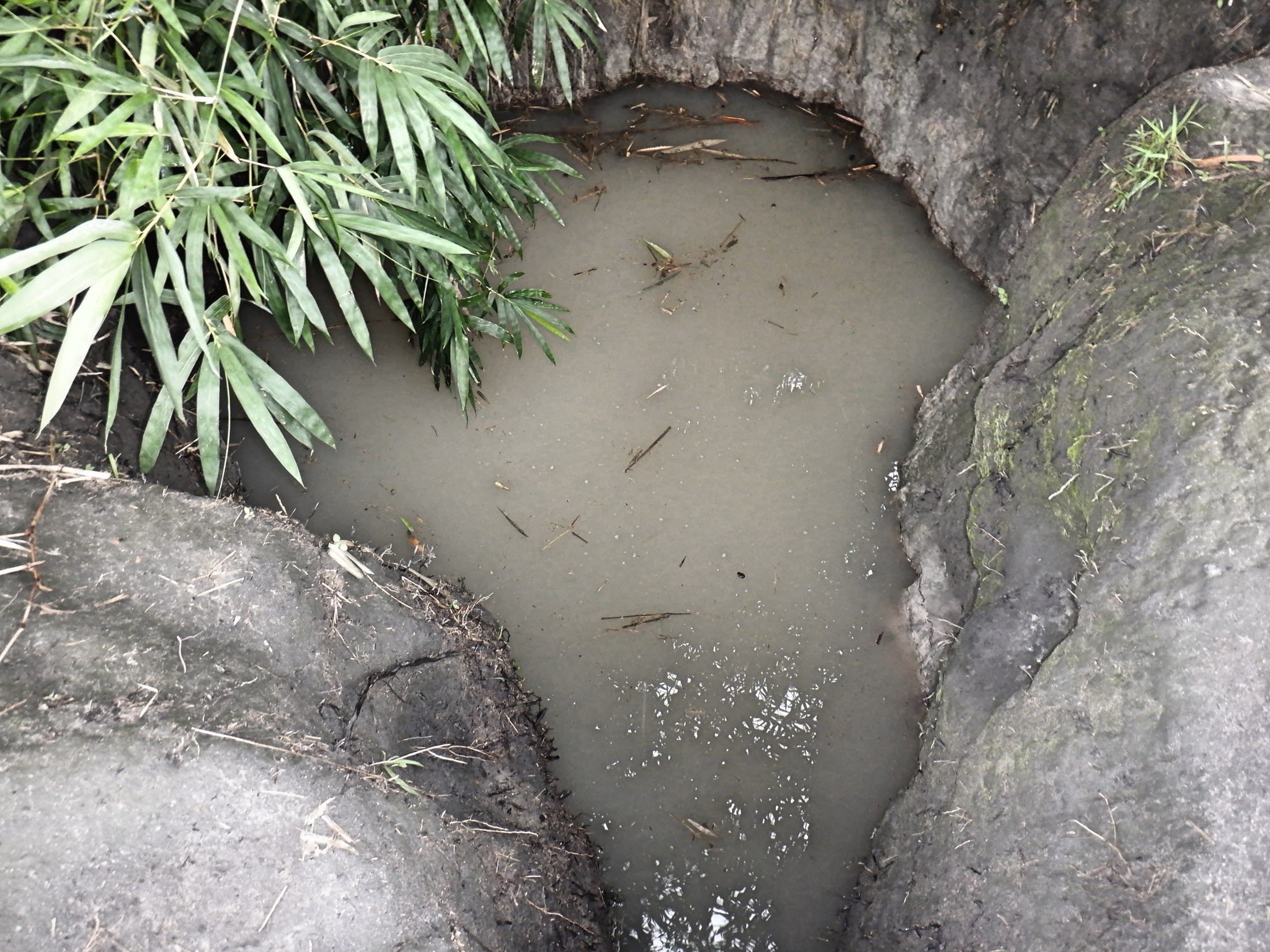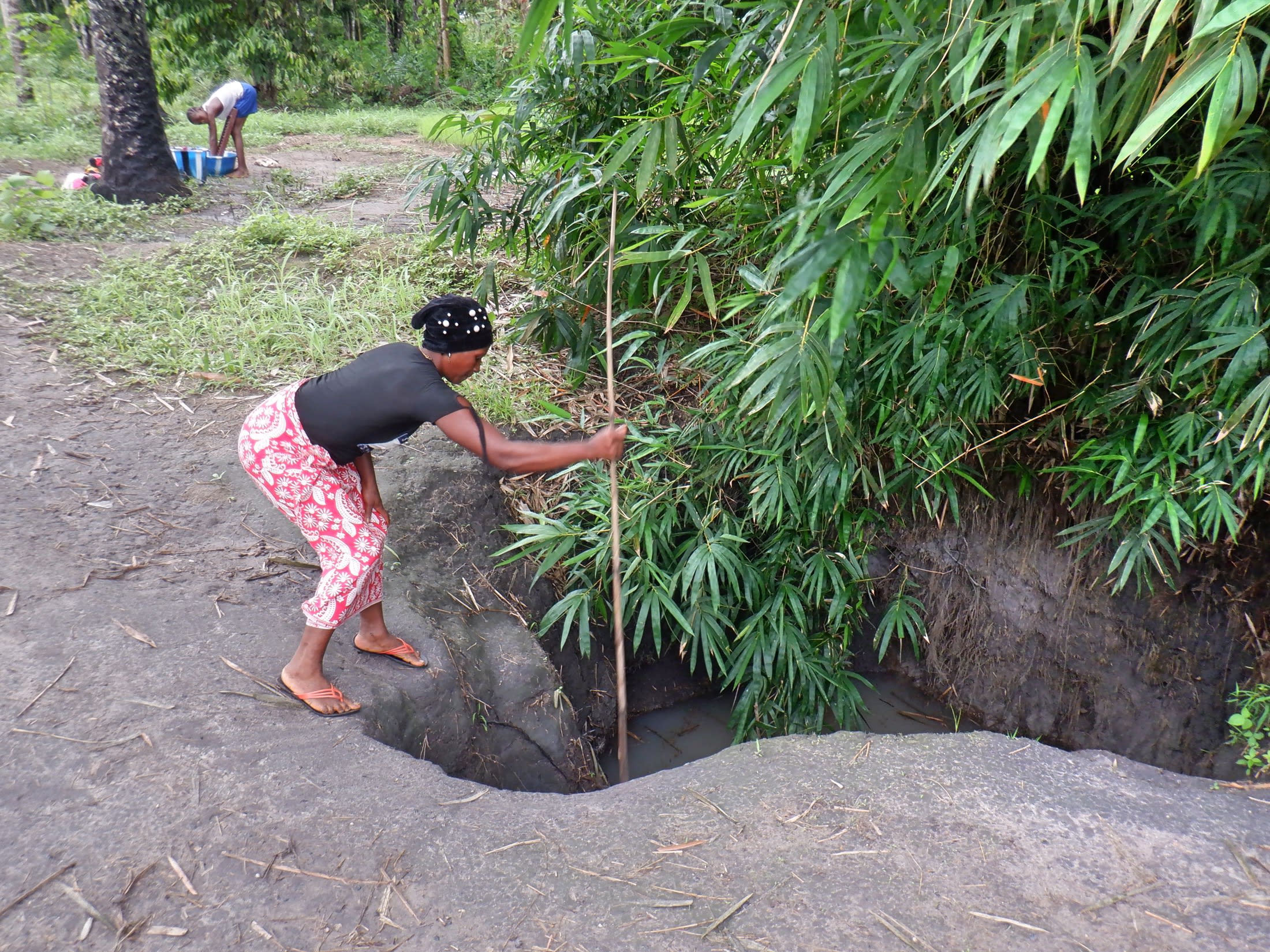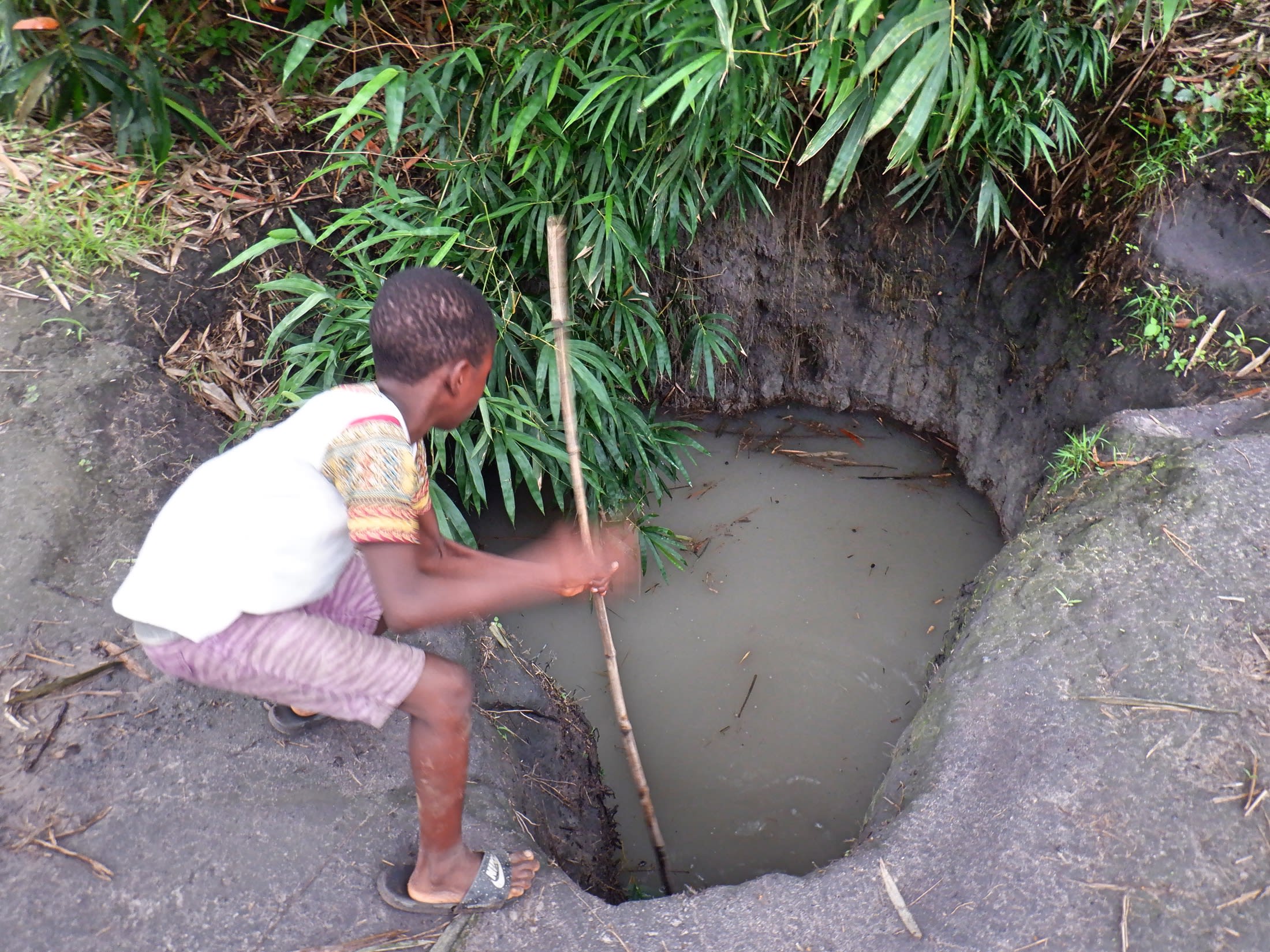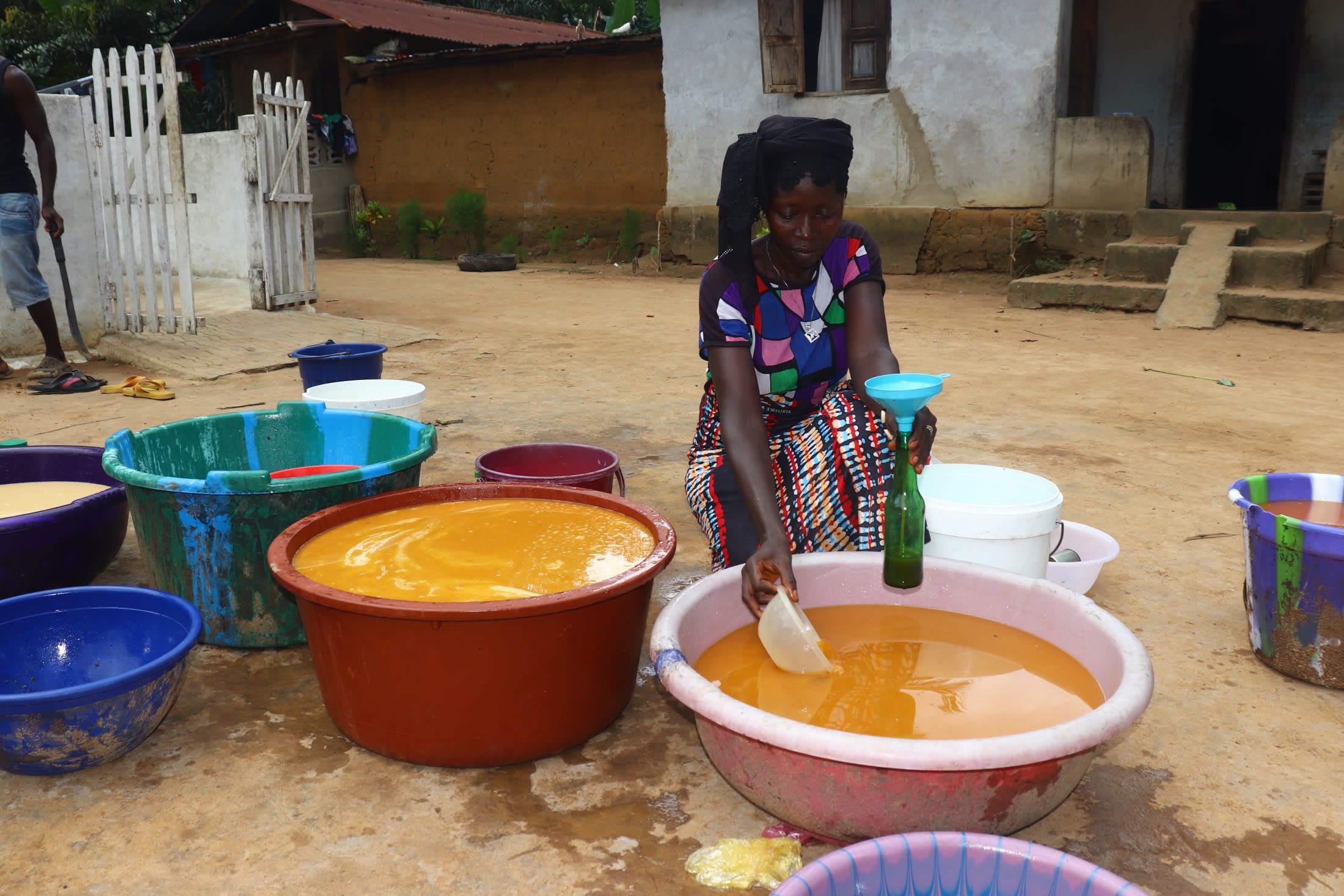January, 2023: Korobana Community Well Complete!
We are excited to share that there is now a safe, reliable borehole well at Korobana Community. As a result, community members no longer rely on unsafe water to meet their daily needs. We also conducted hygiene and sanitation training, which focused on healthy practices such as handwashing and using latrines.

"I want to thank you for drilling a water well in this community. As a trader and also housewife, I have been going through a lot when it comes to water challenges," said 40-year-old chairperson of the water user committee Ramatu Conteh.

Ramatu pours clean water.
She continued: "I will now be able to prepare food for my family on time and clean the environment and the sanitation facilities every morning because there is sufficient water in the community. Also, I will be able to go to the market on time, and I will no longer lose my customers. There will be sufficient, safe, and pure water in the community that will no longer disturb me and my family."
"I used to be late to go to school because there was no water facility that [was] closer to my house and the community as a whole. I used to go to the stream to fetch water. That is the reason I normally missed some lessons and, as [a] result, [it] affected my academic performance. Laundering my school uniform was a challenge in the past [too], " said 14-year-old Adamsay B.

Adamsay collects water with a smile.
"I thank you for the well you constructed because it will impact my life by overcoming the problems I stated above. I will be able to go to school on time, [and] launder my uniform when I [get] off from school. I will no longer walk a long distance to fetch water. There is pure and safe drinking water in the community," Adamsay said.
We held a dedication ceremony to officially hand over the well to the community members. Several local dignitaries attended the ceremony, including representatives from the Port Loko District Council and the Ward 244 Local Council. Each official gave a short speech thanking everyone who contributed to this water project and reminding everyone to take good care of it. Then, Ramatu and Adamsay made statements on their community's behalf. The ceremony concluded with celebration, singing, and dancing.

Celebrating!
New Well
The drill team arrived the day before beginning work. They set up camp and unpacked all their tools and supplies to prepare for drilling the next day. The community provided space for the team to store their belongings and meals for the duration of their stay. The following day, work began.
Our team dug two pits next to the drill rig, one for the drill’s water supply and another for what the drill pulls out of the borehole. In some cases, we order a private supplier to deliver the water for drilling since water access is already challenging.

Day one of drilling began as the team mixed water with bentonite, an absorbent clay, in the two dug pits. Next, the team fixed a four-inch carbide-tipped bit to the five-foot-long drill stem. They started the mud pump to supply water to the drill rig so that drilling could begin!
After putting each five-foot length of drill stem into the hole, the team took material samples. We labeled the bags to review them later and determine the aquifer locations.

On the second day of drilling, the team expanded the hole and cleared it of mud. After reaching a total depth of 18 meters, the team forcefully pumped clean water into the well to remove any dirt and debris from the drilling process. We then protected the screened pipe by adding a filter pack. The team hoisted the temporary drilling casing to fortify the pipes with cement.

Next, we bailed the well by hand for three days before conducting a yield test to verify the water quantity. This well has a static water level of seven meters. With these excellent results, we installed a stainless steel pump. Water quality test results showed that this was clean water fit for drinking!

New Knowledge
Before conducting any hygiene training, we called and visited the local water user committee to understand the community’s challenges and lack of sanitation facilities. We shared the findings from our discussions with the committee members to help them make the necessary adjustments before the training began. For example, we identified households without handwashing stations or ones that may need to repair their latrines. With this information, community members worked together to improve hygiene and sanitation at home.
After this preparatory period, we scheduled a time when members from each household using the water point could attend a three-day hygiene and sanitation training. We then dispatched our teams to the agreed-upon location to hold the meeting.

Training topics covered included handwashing and tippy taps, good and bad hygiene habits, disease transmission and prevention, COVID-19, worms and parasites, proper dental hygiene, proper care of the well's pump, keeping the water clean, the cost recovery system, the importance of using dish racks and clotheslines, the importance of toilets, keeping latrines clean, balanced diets, the diarrhea doll, and HIV and AIDS.
The most memorable topic covered during the training was the importance of practicing proper dental hygiene. The facilitator showed a photo of unclean teeth versus clean teeth and asked the participants to spot the differences. The facilitators told the participants unclean teeth are because proper care is not taken to clean them, especially after eating tobacco leaves, smoking cigarettes, or chewing kola nuts.

The community chief participated in the three days of hygiene and sanitation training. Unfortunately, the chief's teeth looked similar to the unclean teeth discussed. When he realized this, he became angry and immediately stopped participating in the training. The facilitator noticed and went to the chief to ease the tension reassuring him that young people also encounter the same problems with their teeth. The chief was relieved, and the facilitator ended the time by encouraging the whole group to practice proper dental hygiene to avoid tooth decay.

Group learning.
"This training has taught me the importance of washing hands and how it prevents me from contracting diseases. I will use this opportunity to teach my family members who are not here the importance of handwashing, cleaning the environment, building of latrines, bathing shelters, and constructing dish racks. My community lacks all these facilities, but with the knowledge I have gained from this training, I will help to encourage my community people to construct all the things I listed above," said Ramatu, who was quoted earlier.
Conclusion
This project required a substantial collaboration between our staff, our in-country teams, and the community members themselves. When an issue arises concerning the well, community members are equipped with the necessary skills to rectify the problem and ensure the water point works appropriately. However, if the issue is beyond their capabilities, they can contact their local field officers to assist them.
Also, we will continue to offer them unmatchable support as a part of our monitoring and maintenance program. We walk with each community, problem-solving together when they face challenges with functionality, seasonality, or water quality. Together, all these components help us strive for enduring access to reliable, clean, and safe water for this community.
With your contribution, one more piece has been added to a large puzzle of water projects. In our target areas, we’re working toward complete coverage of reliable, maintained water sources within a 30-minute round trip for each community, household, school, and health center. With this in mind, search through our upcoming projects to see which community you can help next!
Thank you for making all of this possible!





 Borehole Well and Hand Pump
Borehole Well and Hand Pump
 Rehabilitation Project
Rehabilitation Project






























